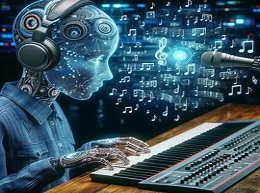AI in Music Composition: From Algorithms to Creative Collaborations

Harmony of Machines: AI Revolutionizing Music Composition
In the digital age, Artificial Intelligence (AI) has permeated every aspect of our lives, including the world of music. From composing melodies to orchestrating symphonies, AI is reshaping the landscape of music composition. This article delves into the evolution of AI in music, exploring its algorithms, applications, and potential for creative collaborations.
Understanding AI in Music Composition: AI-driven music composition involves the use of algorithms and machine learning techniques to generate musical content autonomously or in collaboration with human composers. These algorithms analyze vast datasets of musical compositions, learn patterns, styles, and structures, and produce new compositions that mimic the characteristics of human-made music.
Algorithmic Composition: One of the primary applications of AI in music is algorithmic composition, where machines generate musical pieces based on predefined rules and parameters. For example, Google's Magenta project utilizes deep learning algorithms to create original compositions in various genres, from classical to electronic music. These algorithms can mimic the style of renowned composers or explore entirely novel musical territories.
Enhancing Creativity with AI: Contrary to the notion of AI replacing human creativity, many musicians and composers view AI as a tool to enhance their creative process. By leveraging AI-generated melodies, harmonies, or rhythms as starting points, human artists can explore new musical avenues, experiment with unconventional structures, and break free from creative constraints.
AI-Powered Collaborations: Beyond algorithmic composition, AI is facilitating collaborative efforts between machines and human musicians. For instance, the album "Hello World" by the AI music project Flow Machines features compositions co-created by AI systems and acclaimed musicians. These collaborations blur the lines between man and machine, resulting in innovative, genre-defying music that pushes the boundaries of artistic expression.
Applications Across Genres: AI's influence extends across diverse musical genres, from classical and jazz to pop and electronic music. In the realm of film scoring, AI algorithms can analyze visual cues and emotions to generate soundtracks that enhance the cinematic experience. Similarly, in the realm of electronic dance music (EDM), AI-powered tools enable DJs and producers to generate complex beats, melodies, and soundscapes in real-time, augmenting live performances and studio productions.
Challenges and Ethical Considerations: Despite its transformative potential, AI in music composition poses several challenges and ethical considerations. Issues such as copyright infringement, authenticity, and the role of human creativity in the age of AI warrant careful consideration. Moreover, the democratization of music creation through AI raises questions about artistic ownership, cultural diversity, and the preservation of traditional music practices.
Future Directions and Possibilities: As AI technology continues to evolve, the future of music composition holds limitless possibilities. From personalized music recommendations tailored to individual preferences to interactive experiences where listeners can co-create music in real-time, AI is poised to revolutionize how we engage with and experience music. Moreover, as AI systems become more sophisticated and empathetic, they may even develop the ability to evoke genuine emotional responses through music, further blurring the lines between artificial and human creativity.
In conclusion, AI is not just a tool for automating tasks but a catalyst for innovation and creativity in music composition. Whether it's algorithmic compositions, collaborative projects, or novel applications across genres, AI is reshaping the way we conceive, create, and experience music. As we embrace this technological revolution, it's essential to foster a balance between innovation and human artistic expression, ensuring that AI remains a harmonious partner in the creative process.